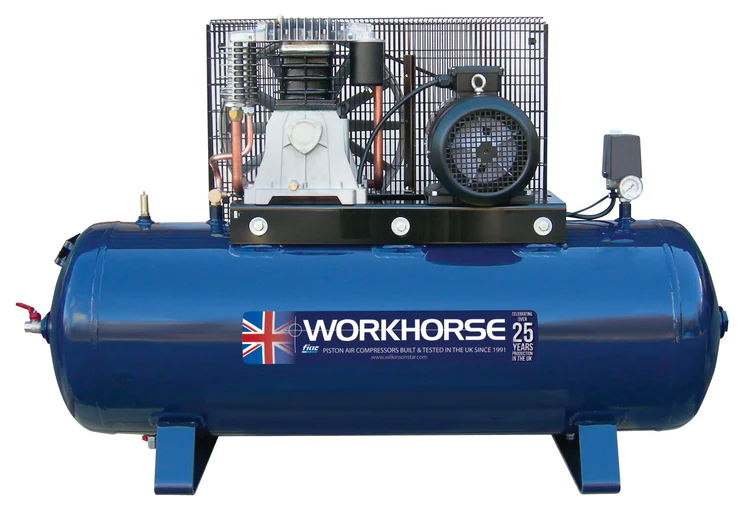
Piston compressors, also known as reciprocating compressors, are probably the first thing that comes to mind when people think about air compressors. As one of the most common types of air compressors, you will likely come across these in many different industries.
Classifying as a displacement compressor, piston compressors are available in single- or double-acting, oil-lubricated or oil-free variations, with different numbers of cylinders in different configurations. Smaller compressors have vertical cylinders, also known as the V-configuration. Double-acting, large compressors use the L-configuration where vertical low pressure cylinder and horizontal high pressure cylinders.
Let’s take a closer look at how piston compressors work, what they are used for and why they are used.
How Does a Piston Compressor Work?
A piston compressor has a valve system and two valve discs, so when the piston moves down, air is drawn into the cylinder and one of the valve discs folds downward to allow the air to pass. Then, when the piston moves up, one of the valve discs folds upwards and closes. Next, the air is compressed and is passed through the aftercooler, continuing into the air tank.
As mentioned above, piston compressors are available in four different sub types:
- Single-stage compressor: One or more cylinders which compress the air from atmospheric pressure to operational pressure.
- Double-stage compressor: Two or more cylinders which gradually compress air to the required pressure level. Cooled with ambient air between steps, it improves efficiency and achieve higher pressure levels.
- High speed (separable) compressor: Operating at a speed between 900 and 1,800rpm, these are driven by engines or motors.
- Low speed (integral) compressor: Operating at a speed between 200 and 600rpm, the driver is mounted into the frame of the compressor.
Plus, you can also choose between an oil-lubricated or oil-free variation. Oil-lubricated piston compressors use oil to lubricate the cylinders, pistons and cranks; there is the risk of oil contaminating your compressed air. Oil-free piston compressors usually see lubricated bearings and grease-free piston rings, but there is usually extra maintenance with these.
What Are Piston Compressors Used For?
Due to their wide range of variations, piston compressors are used within all kinds of industries. This includes for small, intermittent compressed air requirements such as mechanics, workshops, other small settings in addition to larger, industrial setting such as gas processing, refrigeration technology, chemical industries and oil plants.
Why Are Piston Compressors So Popular?
Affordable Air Compressor Option
Piston compressors are one of the most affordable compressed air systems you can purchase and they are also more economical when it comes to operational capacity. They are easy to control and to operate, so you can always make sure they’re cost- and energy-efficient.
Low Maintenance Requirements
Piston compressors are also renowned for low maintenance requirements. Standard maintenance processes will still be required, but looking after your piston compressor will results in longevity and minimal repairs or replacements.
Spare Parts Readily Available
Due to this system being the most popular air compressor and with many different variations available, this means there are always spare parts easily available if you need them and technicians are readily accessible too.
When there are so many options around, it can be difficult know what air compressor is right for you. if you’re wondering whether a piston compressor is the best choice for your operation, speak to our team today who would be more than happy to advise. We also provide other services, such as Installation, Servicing and Maintenance, as well as Quality Testing on top of our wide range of compressors.







